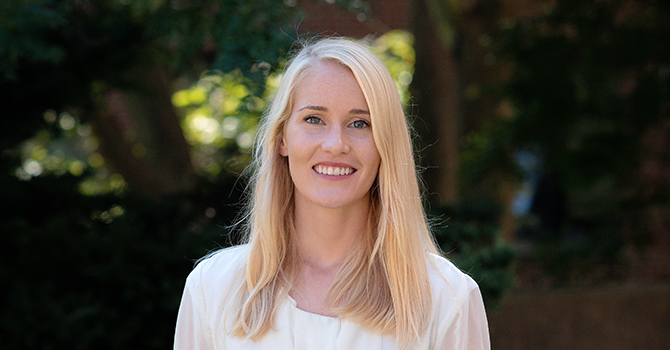A Pioneer in the Family and in Public Health

Chanell Heslop
Master’s Student in Health Management and Policy, Frederick J. Barten Scholarship
I never had a big epiphany where I suddenly understood and loved public health. I've instead experienced a series of evolving phases of my life that have helped me slowly develop a vision of a future in which everyone in our community and our nation and our world is healthier.
A Continuum of Care
The first such phase began when I was diagnosed with a brain tumor at the age of 12. I had emergency surgery two days before Christmas. It was a complicated tumor, difficult to get to. And my doctors explained that I might not walk or have fine motor movements again. I had an excellent care team and eventually recovered. It gave me a very positive view of just how good our medical system can be.
We're good at treating the rare tumor. We're not good at preventing illness and promoting wellness.
But that was care for a complex, procedure-based need. As I was struggling with the tumor, a family member was struggling with mental illness—a much more common diagnosis—and their care was not handled well. Some of it was stigma. Some of it was deficiencies in the provider's training.
We're good at treating the rare tumor. We're not good at preventing illness and promoting wellness. We need to get better at the whole continuum of care, at making people healthier through the whole lifecycle.
Implementing Research
The second phase of my public health evolution was catalyzed by an experience I had as an undergraduate student. We were researching cognitive behavior intervention and discussing the many ways the study could improve health for various populations.
I asked what we were going to do with our research, how we were going to share our knowledge with families at risk. I was told by the project advisor that our job was to publish and the responsibility to implement the results lies with administrative and policy experts.
I sat there looking at a library full of evidence-based knowledge that could impact people's lives in positive ways and wasn't getting implemented. I found it disturbing. I wanted to be one of the people taking the papers off the shelves and implementing the knowledge. It's a messier process, but I knew I had to see the impact.
Asking Questions
Thinking hard about the continuum of care and about the implementation of research would eventually lead me to public health and specifically to my discipline of Health Management and Policy. Ongoing reflections on various phases of my own past supported that direction.
I was not shy about asking questions, but sometimes we didn't know which questions to ask.
I'm from Central Valley in California, the "boring part" between Yosemite and the beach. It's a major agricultural exporter for the entire globe, and many of the region's public health issues are related to poor social and political policy around treating migrant workers equitably. A health policy course I took at UCLA opened my eyes to the ways insurance can affect access to care. Policy and management for me were the path to collecting data and applying that evidence to the population health issues I wanted to solve.
I'm also the first person in my family to enter college. It was difficult to navigate a large academic institution like UCLA. Fortunately, I found my first-gen group there, and we helped each other navigate the culture. I was not shy about asking questions, but sometimes we didn't know which questions to ask. Internships, for example, were something everyone was doing. But no one told me how important they are to building your skill set and your resume. You have to know to ask about internships.
I've continued to ask for things here at Michigan, because that's what I've learned is necessary. But Michigan Public Health truly has everything I was looking for—it nurtures each student's ability to visualize and define the future of public health and allows the diverse student body to create this future through creative and inclusive programming.
An Evolving Vision for Public Health
The Health Management and Policy department here matches incoming master's students with a returning student mentor. I asked to have a mentor who was first-gen. They not only welcomed and accommodated my request, but they found me someone from California! We made an immediate connection about personal and academic life. We both see our background as first-generation students as positive, because we're already pioneers. Our family narrative is an advantage in so many ways.
Our visions for population health have to evolve because today's world is full of dynamic challenges.
This summer I had an internship with Allina Health in Minnesota. I was at a regional hospital working directly with the CEO to learn more about operations in the hospital and strategic approaches to improving care. I watched and engaged firsthand as someone set a vision for the future and worked collaboratively to execute it.
Our visions for population health have to evolve because today's world is full of dynamic challenges. Michigan Public Health's commitment to supporting a diverse student body means it will be successful in cultivating leaders who are prepared for those challenges.
